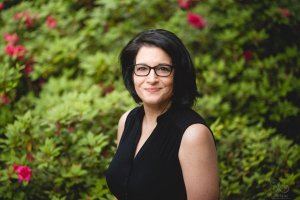Roy H. Park Fellow Deborah Dwyer has been selected for a 2020-21 fellowship at the Donald W. Reynolds Journalism Institute

Roy H. Park Fellow and doctoral candidate Deborah Dwyer has been selected for a 2020-21 fellowship at the Donald W. Reynolds Journalism Institute, headquartered at the Missouri School of Journalism.
Dwyer is one of seven scholars and industry professionals selected out of 620 applications for the fellowship, which partners with newsrooms to create innovative projects strengthening journalism's future.
During her fellowship, Dwyer will take a deep dive into the ethics and practicalities of unpublishing, a main focus of her research as a doctoral student at the UNC Hussman School of Journalism and Media.
Dwyer defines unpublishing as the act of deleting factual content that has been previously published online in response to an external request prompted by personal motivations such as embarrassment or privacy concerns.
Whether it’s a mugshot, unfavorable business review or other content targeted for removal, similar ethical questions arise: What’s the balance between the right to privacy versus the right to know? Where is the ethical line regarding “do no harm” in the digital age?
“Journalism has always prided itself on being the first draft of history,” Dwyer said. “Unpublishing challenges the credibility of news archives and pressures newsrooms to think differently about what they publish. The practice also opens the door for additional attempts to censor news coverage and the reinforcement of societal inequities.”
Dwyer’s unpublishing research — already gaining recognition in publications such as Nieman Lab and the Columbia Journalism Review — has found that the majority of newsrooms lack consistency regarding what content should be removed, who makes the decisions, and the extent that the public is informed.
“We’ve got to find a way to create more consistency, accountability and transparency around unpublishing,” Dwyer said.
Dwyer’s fellowship project aims to do just that by creating an “unpublishing toolkit” for newsrooms of all sizes. Maintained online, the toolkit will include recommendations on:
• Ethical and practical considerations.
• Policy development.
• Communication processes and protocols.
• Key actors and decision-making processes.
• Technological processes.
• Tracking systems.
• Staff input and training.
• Public engagement.
• Strengthening pre-publication practices.
• Methods of accountability and transparency.
Dwyer transitioned into academia from a 25-year career in communications roles including journalism, corporate marketing and media relations. Prior to her doctoral work at Hussman, she served as the director of marketing for the Chattanooga Times Free Press, where she saw firsthand the emerging struggle surrounding unpublishing requests.
Through her research, Dwyer hopes to be a bridge between the academic and professional communications worlds. She’s been a part of both, and as an academic, seeks answers to big questions affecting the day-to-day work of professionals.
The fellowship will allow her to continue the work she’s started at Hussman, which she describes as “pursuing big questions that will help journalism, which I believe is the bedrock of our democracy.”
“Hussman has taught me to be a rigorous scholar,” Dwyer said. “I know I have the tools I need to do this work.”
Learn more about Dwyer’s work and research.
Learn more about the other Donald W. Reynolds Journalism Institute 2020-21 fellows.